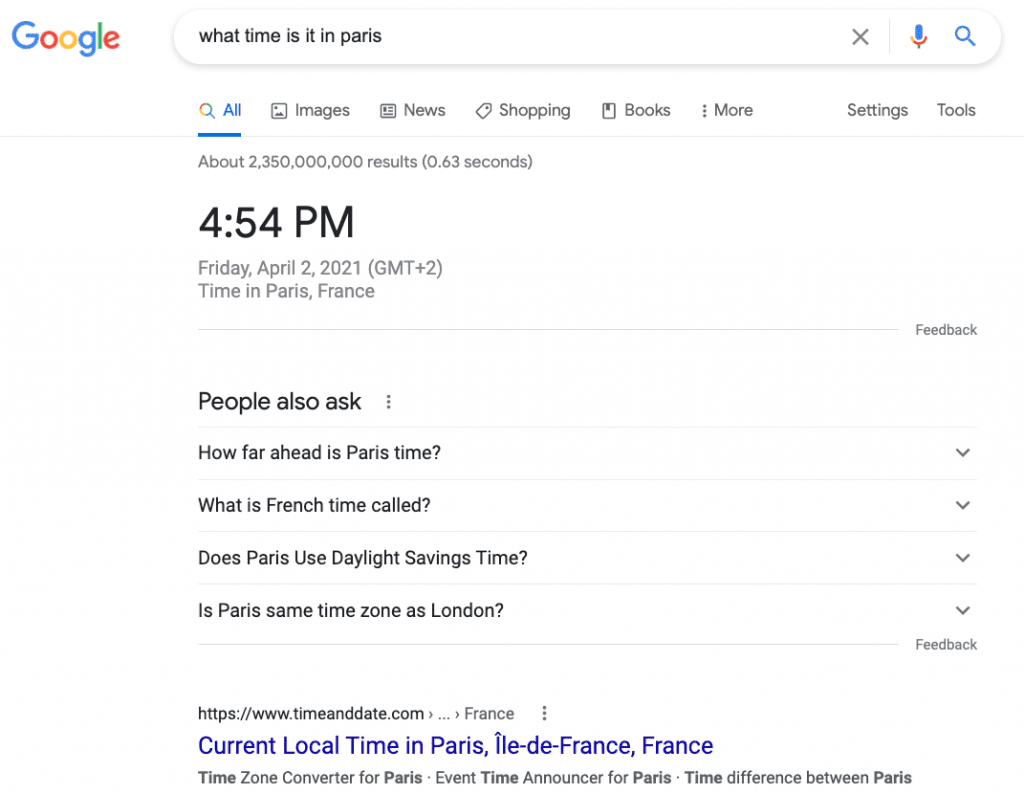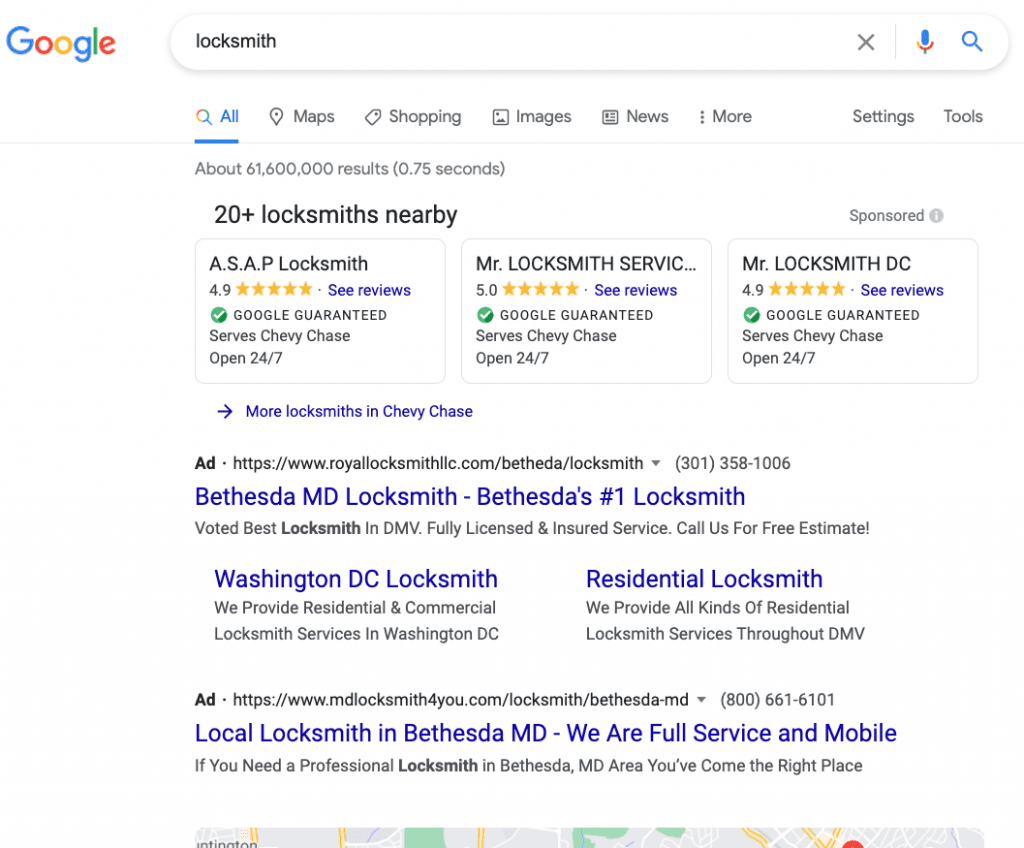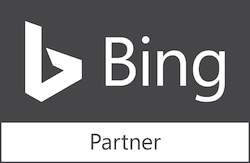Recently, there was an uproar among leading SEOs (search engine optimization experts) over Zero-click searches and whether or not Google is unfairly using its market dominance to steal traffic that otherwise would have clicked to a website not named Google. In a SimilarWeb study compiled by Rand Fishkin, founder of SparkToro and former founder of MOZ, he notes between January and December 2020, nearly 65% of Google searches ended without a click to another web property, up from 50% in June 2019.


Most SEOs don't have an issue with queries like the example above. The user benefits by getting a quick answer and it isn't clear there is a publisher who lost out by not capturing that traffic with a click to their website. Other Zero-click results have a greater impact on lost traffic to websites. However, as queries change, so do the complexities of this debate. Search "weather forecast" on Google and you'll get your answer in the search result, but this is traffic that once went to Weather.com, Weatherbug.com, etc. Search "NCAA scores" and you'll find every score of the most games in the search result and this was once traffic that went to ESPN.com, SI.com, etc. Still, the advantage is to the user. They found exactly what they were looking for without having to click through to a website. As a greater portion of users are searching from mobile phones, which can take a while to download full websites, and not having to click away from the search results page is an advantage for them.
As we review other verticals, like airline and hotel reservations, job searches, retail shopping, and others, all of which (and more) have Zero-click Google search results, it is clear why there is debate over the fairness of Zero-clicks. And, in the last 18 months, Google has also moved into local services by providing an alternative to Sponsored Results (Google Ads). A search for "locksmith" (below) returns a result which now includes a "Local Service Ad" carousel at the top of the page (also part of Google Ads, but being tested and not available for all verticals in all locations). When clicking on one of these ads, the user is not navigated to the company's webpage but to a Google substitute for that web page.

Most SEOs don't have an issue with queries like the example above. The user benefits by getting a quick answer and it isn't clear there is a publisher who lost out by not capturing that traffic with a click to their website. Other Zero-click results have a greater impact on lost traffic to websites. However, as queries change, so do the complexities of this debate. Search "weather forecast" on Google and you'll get your answer in the search result, but this is traffic that once went to Weather.com, Weatherbug.com, etc. Search "NCAA scores" and you'll find every score of the most games in the search result and this was once traffic that went to ESPN.com, SI.com, etc. Still, the advantage is to the user. They found exactly what they were looking for without having to click through to a website. As a greater portion of users are searching from mobile phones, which can take a while to download full websites, and not having to click away from the search results page is an advantage for them.
As we review other verticals, like airline and hotel reservations, job searches, retail shopping, and others, all of which (and more) have Zero-click Google search results, it is clear why there is debate over the fairness of Zero-clicks. And, in the last 18 months, Google has also moved into local services by providing an alternative to Sponsored Results (Google Ads). A search for "locksmith" (below) returns a result which now includes a "Local Service Ad" carousel at the top of the page (also part of Google Ads, but being tested and not available for all verticals in all locations). When clicking on one of these ads, the user is not navigated to the company's webpage but to a Google substitute for that web page.
The debate becomes more heated when we think about Google's monopoly power. To be sure, a lot of smart SEOs weighed in on both sides of the argument. It felt like there were some hurt feelings and in the end, in my opinion, no one won or lost this debate. If you want to check it out, here's Danny Sullivan's response to Rand and I'm sure that will lead you down several rabbit holes if you care to. The point of this post is not to provide some fake expertise in US antitrust law and espouse a radical plan for breaking the GAF-triopoly (Google-Amazon-Facebook). The objective here is to move beyond the debate and review the ways in which SEOs should leverage Zero-click data -- and yes, not having a click to count does not mean we do not have data.
This process begins with the data Google chooses to display in a variety of results, including Featured Snippets, Knowledge Panels, Verticalized Search, Zero-click, Carousels, and Local packs, to name a few. You should notice that each type of result refers to a website or a group of websites and, for the most part, the data you find in all of these results was provided by these very websites. That's right, your company's information (i.e. location, hours, contact info, pictures, products, prices, etc.) is a result of your information being uploaded into your Google My Business account, or leveraging Schema Markup or Google and Bing simply crawling your site, learning more about you and using your website's information in their search results. If you are not auditing your website's technology frequently and if you are not optimizing on-page content, you will not be visible to your prospects in the search results.
The question many SEOs are asking is: How do I show my client the benefit of this work if I cannot show improvement in SERPs or clicks? It is a fair question and a frustrating one, too. At periscopeUP we have tried to move our clients from a click orientation to having a greater focus on conversions, leads, and sales. After all, the point of all of this is build business, not count clicks. We have failed and we've succeeded. Our clients still want SERP data and clicks/visits, but we are also tracking and reporting on more meaningful engagement metrics, like sales, phone calls, conversion attribution, etc. Below is a short list of data you may consider using to create more meaningful reports for your clients.
- Keywords in Position Zero -- use one of the many SEO tools to determine which search queries result in your client's website are showing up in Featured Snippets, Knowledge Graphs, or Answer Boxes.
- Google Search Console -- tracking impressions and clicks over time will help you to make the case to your clients. While impressions and clicks may be dropping, you will be able to demonstrate movement into Position Zero, which may not result in a click but is still a valuable opportunity to reach your client's prospects and display their expertise.
- Google My Business -- monitor the number of prospects who request directions or call your clients directly from your Google listing.
- Google Analytics -- track meaningful organic engagement like downloads, videos watched, sales, phone calls, forms requesting more info, etc.
Google SERPs will continue to change. This is challenging for SEOs, but it is also an opportunity to educate our clients and help them move beyond SERPs and clicks and into more strategic thinking about their website.
Need a digital marketing strategy overhaul? We can help. Call (443) 475-0787.







